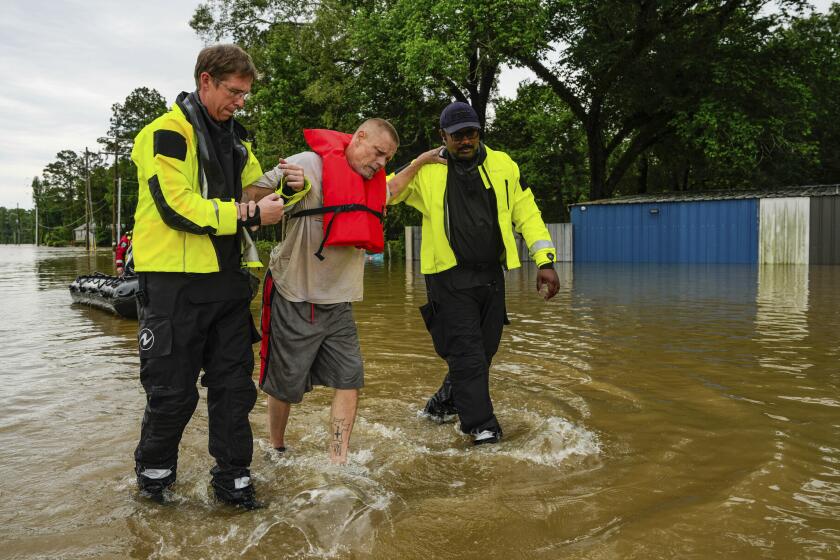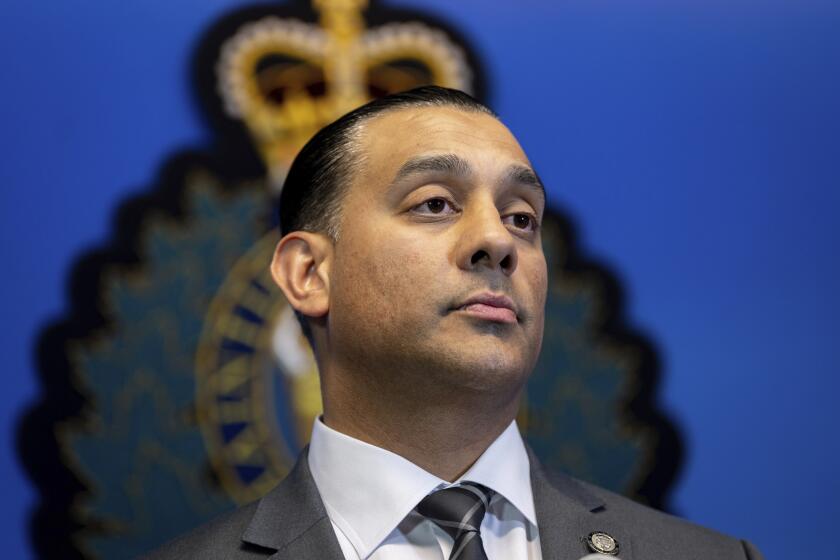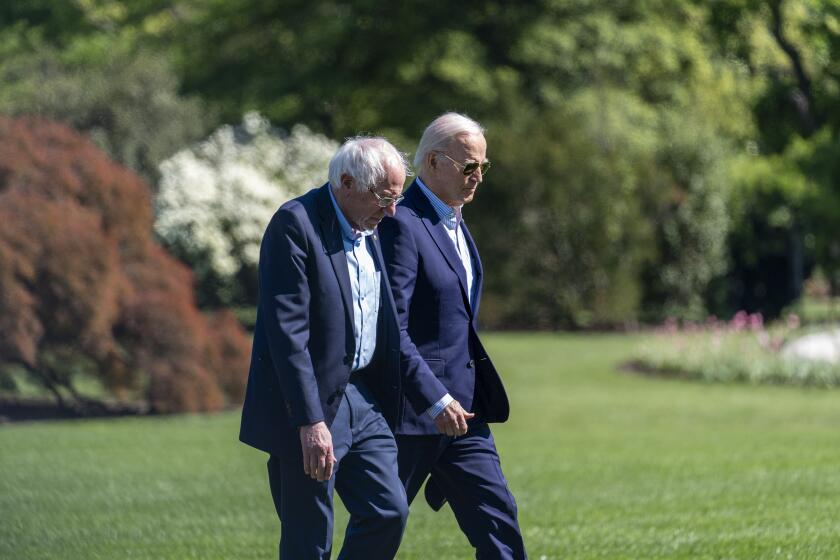Enlisting Support on Iraq Still Elusive Goal for Bush
The world’s most powerful leaders may be seeking a united strategy on Iraq, but they apparently came to the opening of the U.N. General Assembly on Tuesday unwilling to cede major ground to find it.
As a result, the best-case scenario is likely to be eventual passage of a new Security Council resolution that neither brings the world together nor quickly produces large numbers of troops or funds from other countries, American officials and foreign diplomats said.
In other words, the Bush administration might get the language it is seeking on Iraq but little of the substance needed to help secure and rebuild the country.
The worst-case scenario is ongoing diplomatic gridlock. This is a distinct possibility, given that world leaders still seem to be sparring over the past as well as debating the future.
All sides are responsible for failing to bridge the gap, U.S. analysts say.
Facing demands for a greater U.N. role, President Bush did call in his speech to the General Assembly for the world body to help Iraqis write a new constitution and hold elections. But he made it clear that Washington is not willing to cede control of the transition to the U.N. or accelerate the hand-over to Iraqis, as some nations have urged.
“Bush showed a little leg, but very little leg,” said Ken Pollack, a former National Security Council staff member in the Clinton and Bush administrations who is now at the Brookings Institution think tank. “He indicated there are some areas where it’s appropriate for the U.N. to participate, but they are minor areas, subordinate to the U.S. role in Iraq.”
Added Judith Yaphe, a former CIA analyst who is now at the National Defense University, “The terms are probably not going to be any more acceptable now to the key allies whose help and approval we seek -- France, Russia, Turkey, Germany, for example -- than they were before the war.”
The policy chasm between the U.S. and France, whose positions have defined the global split over Iraq, was reflected at a news conference by French President Jacques Chirac.
He extolled the “deep friendship” between the two nations and expressed his hope that Washington succeeds in Iraq. And in talks with Bush, the French leader indicated that Paris would not veto a Security Council resolution that would put a U.N. imprimatur on efforts to stabilize postwar Iraq and attract wider aid.
Yet Chirac also warned of further deterioration in Iraq if the U.S.-led occupation administration does not soon grant provisional sovereignty to the Iraqi Governing Council, an interim panel whose 25 members were appointed by the coalition.
“We have to shift from one foot to the other, as it were, and say to the Iraqis: You are a major, great people. It is up to you to decide what your fate will be. We want to express this will of ours by a very clear-cut, symbolic gesture, which is the transfer of sovereignty,” he told reporters.
Bush and other world leaders are talking past one another, said Henri J. Barkey, a former State Department policy planning staffer on Iraq who is chairman of the international relations department at Lehigh University. “The divide is as wide as before the speeches,” he said.
The positions reflect a degree of hypocrisy by both the U.S. and France, analysts added.
“You have to admire the nerve of the French, who at first dismissed the Governing Council as stooges and are now calling on us to hand over power faster,” said David L. Mack, a former U.S. diplomat who served twice in Baghdad and is vice president of the Middle East Institute in Washington. “I sense the French want to be involved in Iraq but don’t want to appear to accept the reality that the [Americans] are the senior partners in the effort.”
Bush, in turn, was reluctant to admit how much the U.S. needs the world’s help in Iraq.
“There is something deeply ironic about going to the United Nations to seek military help to deal with the aftermath of a war the U.N. asked be delayed, a war the United States fought to deal with a threat that so far does not seem to have existed and a war in which the United States needs military assistance to deal with the aftermath of a major ‘victory,’ ” said Anthony H. Cordesman of the Center for Strategic and International Studies in Washington.
“The fact is that President Bush is going to the U.N. because his administration was misguided in the course it set for postwar Iraq,” he added.
Both leaders may be playing in part to their own constituencies. The Bush administration is asking Congress for more than $20 billion for Iraq’s reconstruction, and ceding substantial control of the process to the United Nations could make passage much tougher. Chirac may be influenced by opinion polls showing that the vast majority of his countrymen opposed the war.
“For domestic political reasons, both Bush and Chirac may want to be seen dismissing the other’s position out of hand,” even though the two share the goal of stabilizing Iraq, Mack said.
Bush will continue to lobby for additional support in Iraq in talks with world leaders attending the U.N. General Assembly. Today, he will confer with German Chancellor Gerhard Schroeder and over the weekend he will meet with Russian President Vladimir V. Putin at Camp David.
But because the policy gap lingers, Bush now faces “very long odds” of persuading major powers to help, Barkey said.
“In some ways, Bush was doomed to fail,” Barkey said, adding that to win wide support, Bush would have had to remind other nations that the U.S. has come to their aid many times in the past, “and now the U.S. is appealing to the U.N.” for assistance. “And that would have admitted defeat.”
*
(Begin Text of Infobox)
Voices
‘The war launched without Security Council authorization shook the multilateral system.... In an open world, no one can live in isolation. No one can act in the name of everyone. No one can accept the anarchy of a society without rules.’
French President
Jacques Chirac
*
‘It is not enough to denounce unilateralism, unless we also face up squarely to the concerns that make some states feel uniquely vulnerable.... We must show that those concerns can, and will, be addressed effectively through collective action. Excellencies, we have come to a fork in the road.’
U.N. Secretary-General
Kofi Annan
*
‘President Bush gave a comprehensive and compelling address.... His leadership has strengthened the international community, by leading the war against scourges such as terrorism and AIDS. Now the international community needs to step up to the plate.’
Speaker of the House
J. Dennis Hastert (R-Ill.)
*
‘[Bush] could have made the case for more troops, more resources. He didn’t do that.... It was a missed opportunity and that’s very disappointing.’
Senate Minority Leader
Tom Daschle (D-S.D.)
*
‘I wasn’t particularly impressed with anything [Bush] came up with. He just brought up some old issues.’
Staff Sgt. Jason Dungan of the U.S. Army’s 4th Infantry Division, based in Tikrit, Iraq
*
‘[Bush’s] message to the Middle East, to the Arabs particularly, was very negative. He practically blocked any hope on dynamic policy, on diplomacy, on the Palestinian issue. There is nothing new, except more propaganda, more rhetoric, more “moralizing” -- because I don’t think these policies are moral.’
Mohammed Sayed Said, deputy director of Cairo’s Al Ahram Center for Political and Strategic Studies
*
‘As the principal target of terrorists worldwide, the United States does not have the luxury of sitting on the sidelines and waiting for others to carry out their responsibilities, as much of the world community regrettably has chosen to do.’
Rep. Henry J. Hyde (R-Ill.)
*
‘The war has created far many more problems than those it intended to solve.’
Indonesian President
Megawati Sukarnoputri
More to Read
Start your day right
Sign up for Essential California for news, features and recommendations from the L.A. Times and beyond in your inbox six days a week.
You may occasionally receive promotional content from the Los Angeles Times.






